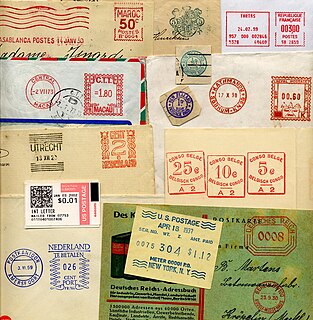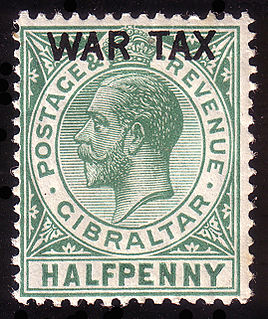
The Stamp Act of 1765 was an Act of the Parliament of Great Britain that imposed a direct tax on the British colonies and plantations in America and required that many printed materials in the colonies be produced on stamped paper produced in London, carrying an embossed revenue stamp. Printed materials included legal documents, magazines, playing cards, newspapers, and many other types of paper used throughout the colonies. Like previous taxes, the stamp tax had to be paid in valid British currency, not in colonial paper money.

The Inland Revenue was, until April 2005, a department of the British Government responsible for the collection of direct taxation, including income tax, national insurance contributions, capital gains tax, inheritance tax, corporation tax, petroleum revenue tax and stamp duty. More recently, the Inland Revenue also administered the Tax Credits schemes, whereby monies, such as Working Tax Credit (WTC) and Child Tax Credit (CTC), are paid by the Government into a recipient's bank account or as part of their wages. The Inland Revenue was also responsible for the payment of child benefit.
A stamp act is any legislation that requires a tax to be paid on the transfer of certain documents. Those who pay the tax receive an official stamp on their documents, making them legal documents. A variety of products have been covered by stamp acts including playing cards, dice, patent medicines, cheques, mortgages, contracts, marriage licenses and newspapers. The items often have to be physically stamped at approved government offices following payment of the duty, although methods involving annual payment of a fixed sum or purchase of adhesive stamps are more practical and common.
The Declaration of Rights and Grievances was a document written by the Stamp Act Congress and passed on October 14, 1765. It declared that taxes imposed on British colonists without their formal consent were unconstitutional.
Grosjean v. American Press Co., 297 U.S. 233 (1936), was a decision of the United States Supreme Court over a challenge to a separate sales tax on newspapers with circulation of over 20,000.

Herbert L'Estrange Ewen (1876–1912) was a British stamp dealer and philatelist in Swanage, Dorset and later in Norwood, London who was an authority on railway stamps. According to Brian Birch, Ewen collected stamps at the age of ten and started his own firm, the H. L’Estrange Ewen company, on his thirteenth birthday.

A meter stamp, or meter mark, is the impression made by a postage meter machine that indicates that postage has been paid on a letter or parcel. Meter stamps are widely used by businesses and organisations as they are more efficient than using postage stamps.
The Foreign and Commonwealth Office Collection was formed by instruction from the Secretary of State for the Colonies on 23 April 1890 to all territories under his authority. The intention was to have a record of all Colonial Postage and revenue stamps, postcards, embossed envelopes and newspaper wrappers. The collection contains single examples of the stamps in use at that time as well as some obsolete issues and single copies, usually from first printings, from 1890. Variations such as colour varieties and alternate watermarked papers are included.
The Board of Inland Revenue Stamping Department Archive in the British Library contains artefacts from 1710 onwards, and has come into existence through amendments in United Kingdom legislation.
The Fitzgerald Collection is an extensive philatelic collection of air mail stamps donated to the British Library and announced in 1951.
The Davies Collection is a collection of Libyan revenue stamps from 1955 to 1969, formed from material from the Bradbury Wilkinson Archive, and presented to the British Library Philatelic Collections by John N. Davies in 1992.

The Langmead Collection is a collection of British and Irish telegraph stamps and stationery from 1851 to 1881 that forms part of the British Library Philatelic Collections. It was formed by Peter Langmead and received by the Library under the "in lieu of tax" scheme in 1991.

The Wilson-Todd collection is a collection of postage stamps issued during, or associated with, the First World War, including many war tax stamps, that forms part of the British Library Philatelic Collections. It was created by James Wilson-Todd and donated to the British Museum by his mother Lady Wilson-Todd after his death.
The H.M. Customs and Excise Collection is a collection of British revenue stamps in proof or registration form for Table Water Duty, Medicine Tax, Playing Card Tax and other duties. It forms part of the British Library Philatelic Collections and was transferred to the Library by H.M. Customs & Excise in 2002.
The Turner Collection of Forgeries is a collection of forgeries of postage stamps of the world to about 1900 that forms part of the British Library Philatelic Collections. It was formed by S.R. Turner and donated in 1973.

The Turner Collection of Railway Letter Stamps is a collection of railway letter stamps of the United Kingdom from 1891 to the mid-1940s that forms part of the British Library Philatelic Collections. It was formed by S.R. Turner and donated in 1973.

The Ewen Collection is a collection of railway letter stamps of the United Kingdom from 1891 to 1912 that forms part of the British Library Philatelic Collections. It was formed by Herbert L'Estrange Ewen and donated in 1949 by his sister Mrs Clement Williams.
The Kaluski Collection is a collection of stamps of Poland that forms part of the British Library Philatelic Collections. It was formed by Janusz Kaluski and donated to the library in 2003 and includes 46 volumes detailing the stamps and postal history material of Poland from 1835 to 2002.









